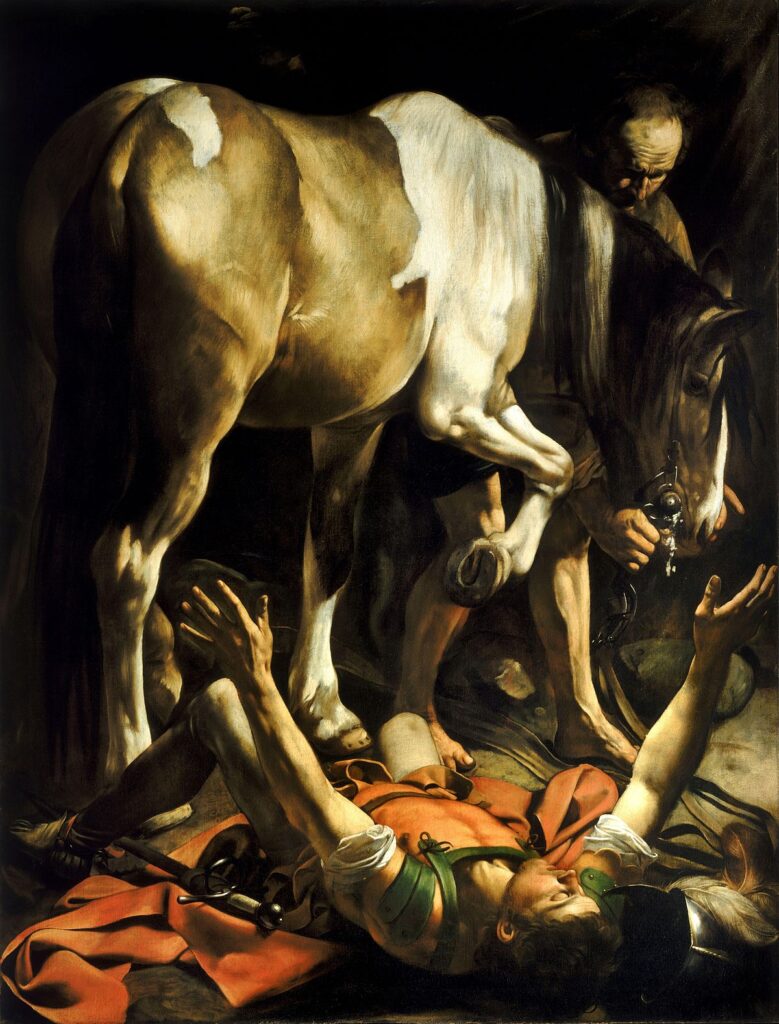Spiritual Sunday
I have an action-packed church service today, what with serving as crucifer, server, and lector. I’m particularly looking forward to reading the story of Saul/Paul’s road-to-Damascus conversion. It’s quite dramatic:
Saul, still breathing threats and murder against the disciples of the Lord, went to the high priest and asked him for letters to the synagogues at Damascus, so that if he found any who belonged to the Way, men or women, he might bring them bound to Jerusalem. Now as he was going along and approaching Damascus, suddenly a light from heaven flashed around him. He fell to the ground and heard a voice saying to him, “Saul, Saul, why do you persecute me?” He asked, “Who are you, Lord?” The reply came, “I am Jesus, whom you are persecuting. But get up and enter the city, and you will be told what you are to do.” [The men who were traveling with him stood speechless because they heard the voice but saw no one. Saul got up from the ground, and though his eyes were open, he could see nothing; so they led him by the hand and brought him into Damascus. For three days he was without sight, and neither ate nor drank.
The self-mocking narrator of Ralph Ellison’s Invisible Man has a fun take on the episode. Invisible Man has just found a new cause to believe in, one that he is sure will stick this time: he will join the Brotherhood, perhaps a reference to the American Communist Party. With his oratorical skills, he is sure he will go far:
Still, I liked my work during those days of certainty. I kept my eyes wide and ears alert. The Brotherhood was a world within a world and I was determined to discover all its secrets and to advance as far as I could. I saw no limits, it was the one organization in the whole country in which I could reach the very top and I meant to get there. Even if it meant climbing a mountain of words. For now I had begun to believe, despite all the talk of science around me, that there was a magic in spoken words. Sometimes I sat watching the watery play of light upon Douglass’ portrait, thinking how magical it was that he had talked his way from slavery to a government ministry, and so swiftly. Perhaps, I thought, something of the kind is happening to me. Douglass came north to escape and find work in the shipyards; a big fellow in a sailor’s suit who, like me, had taken another name. What had his true name been? Whatever it was, it was as Douglass that he became himself, defined himself. And not as a boatwright as he’d expected, but as an orator. Perhaps the sense of magic lay in the unexpected transformations.
Had he had recalled his grandfather’s words at this moment, however, he might have been a bit more tempered in his enthusiasm:
“You start Saul, and end up Paul,” my grandfather had often said. “When you’re a youngun, you Saul, but let life whup your head a bit and you starts to trying to be Paul — though you still Sauls around on the side.”
Don’t go thinking you’ve become a saint, in other words.
Poet Sir John Betjeman also has a tempered view of transformation. In “The Conversion of St. Paul,” he notes that most of us do not have Paul’s blinding come-to-Jesus moment. The process is more of a stumbling and blindly groping affair.
The Conversion of St. Paul
By Sir John BetjemanWhat is conversion? Not at all
For me the experience of St Paul,
No blinding light, a fitful glow
Is all the light of faith I know
Which sometimes goes completely out
And leaves me plunging into doubt
Until I will myself to go
And worship in God’s house below —
My parish church — and even there
I find distractions everywhere.What is Conversion? Turning round
To gaze upon a love profound.
For some of us see Jesus plain
And never once look back again,
And some of us have seen and known
And turned and gone away alone,
But most of us turn slow to see
The figure hanging on a tree
And stumble on and blindly grope
Upheld by intermittent hope.
God grant before we die we all
May see the light as did St Paul.
I’ll have to admit my experiences have been more like Betjeman’s than like Paul’s. Then again, God accepts us, whatever road we take to get there.
